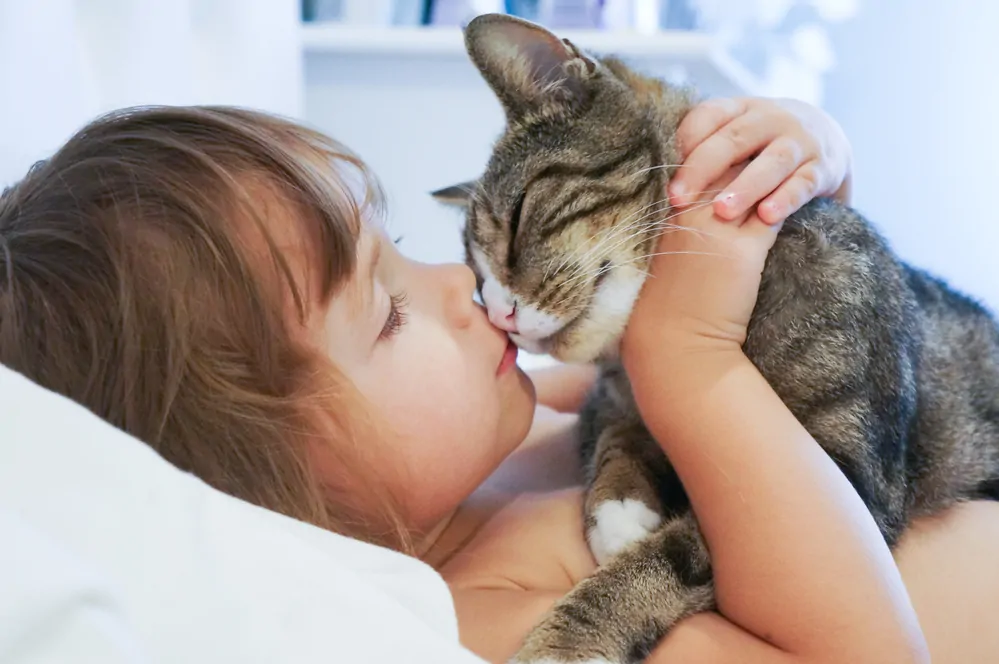There’s little more unnerving about waking up in the middle of the night to ask yourself, “Why is my cat hissing at thin air?”
Has this ever happened to you?
Cats can be a little barrel of curiosity, doing things that make little to no sense to us, sometimes leaving us baffled.
The answer could be one or several different things. Anxiety, pain, fear, smell that the cat takes offense to, unfamiliar or unliked fellow pets, or even frequencies that it can hear that we can’t that are bothering it.
Keen observation may be necessary to try and narrow down what the reasons might be if it isn’t something obvious.
Obvious means watching the neighbor’s dog for the weekend, causing the cat to feel uncomfortable or downright angry.
That would be obvious and easy to deal with. But if it’s hissing at thin air, then some deeper investigative work will have to be done on your end.
Cat Hissing for No Reason

Cats never feel like hissing out of the blue.
Just because it seems that way doesn’t mean that it’s practicing. There’s always a reason; we only need to figure out what it could be.
The following are some reasons that could cause your cat to start hissing at things that appear to be out of thin air.
But first, why do cats hiss in the first place?
Why Do Cats Hiss?
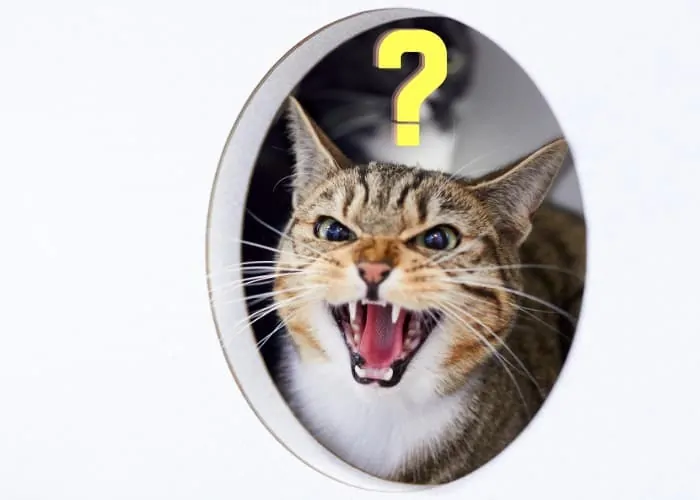
When cats hiss, you’ll notice that three different actions will correspond with the hiss.
- First, the cat will follow-up by standing its ground and eventually sitting down or laying down.
- Second, the cat will follow-up with an attack of some sort toward the object of its hiss.
- Third, the cat will follow-up by retreating to somewhere that makes it feel like it’s safe. In this case, the hiss would be more aligned to appear as a bluff.
Those are things that will typically happen just after a hiss or several hisses. They’re reactions. But initially, the hiss itself has nothing to do with the reactions, though they appear to be closely related.
Hissing is a warning.
It’s an expression to let whoever’s paying attention that it wants to be left alone, or an agitation to stop.
Another cat would be provoked to respond to a hiss by using any of the three reactions listed above.
We, on the other hand, tend to make assumptions if it’s out of nowhere, or immediately feel compelled to start giving the cat attention to see if there’s an issue.
Sometimes this works out, and the cat relaxes; other times, people get scratched.
Cats Growling and Hissing
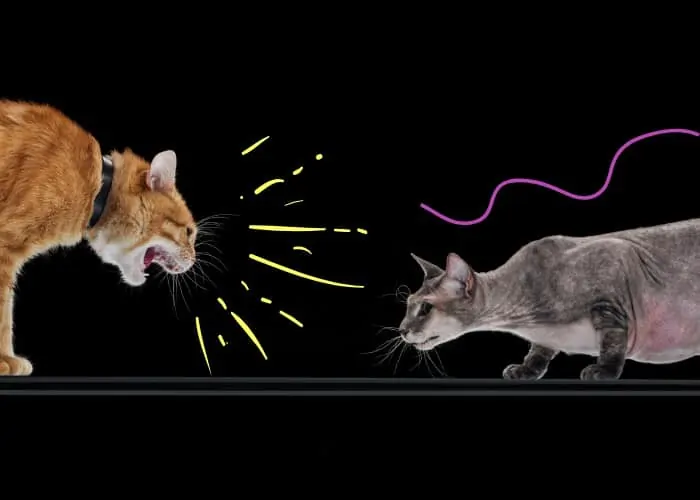
Often, a cat will growl and hiss when it’s either threatened, upset, or angry or maternal aggression towards people. When a cat is caught off guard, or if something happens suddenly, the cat may just hiss.
Growls and hisses happen when a threat of some kind is perceived rather than by just being alarmed.
For example, a cat may hiss at another cat, then take off under a couch. From under the couch, you’ll hear a medley of hissing and growling if the other cat comes near or remains within eyeshot.
Growling can mean much of the same things as hissing but is just a more threatening delivery system.
What is your Cat Hearing?
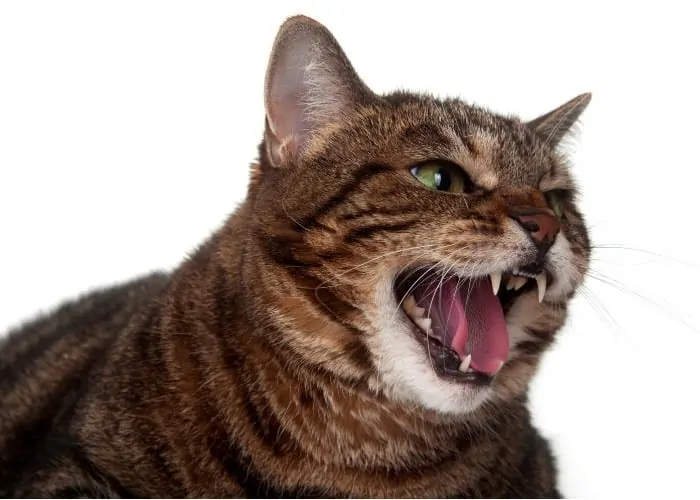
Cats have better and far more sensitive hearing than we do. Subtle noises that we’d never notice could be driving a cat to start hissing, in hopes that the noise goes away.
Some electronics can do it, or even hearing some outdoor action that you might not hear can do it.
What is your Cat Seeing?
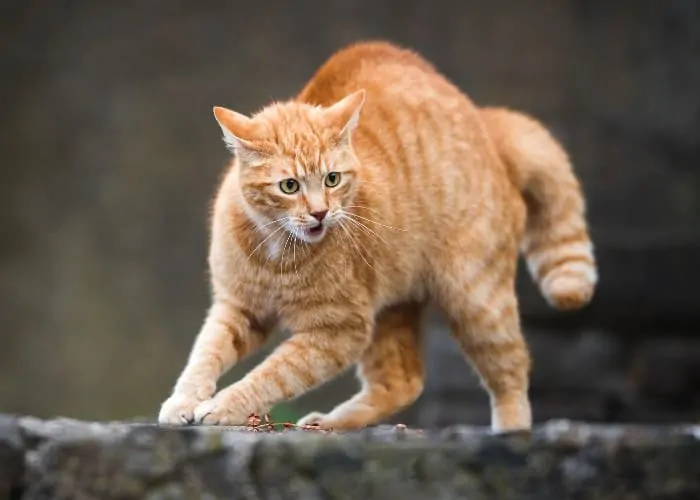
Perhaps your cat is seeing something that’s bothering it that you can’t see, or just missed? Also, once a cat gets freaked out, it can stay that way for a time.
For example, say your cat gets triggered by a raccoon at the window. By the time you notice, the raccoon has run away, and your cat wound up in the center of the room. Just because the raccoon is gone doesn’t mean that the cat is suddenly relaxed.
It might hiss at anything that moves (including you) for quite a while after that kind of circumstance.
Is My House Haunted?
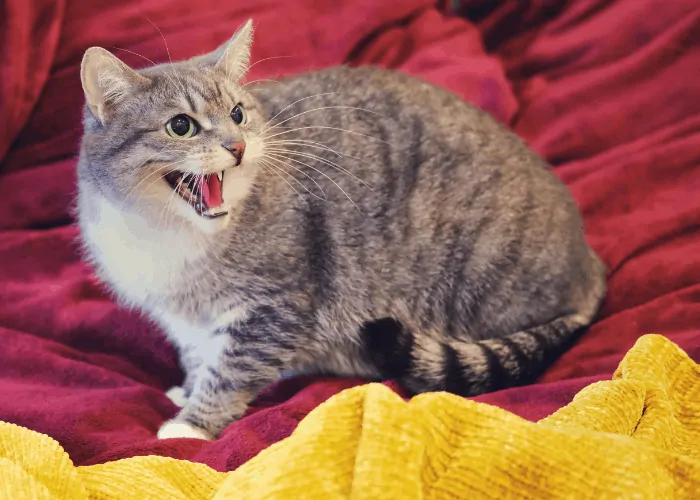
I guess it’s not for me to say whether your house is haunted or not, but this doesn’t need to be a knee jerk thought or reaction when a cat starts hissing for no apparent reason.
Due to the object of the cat’s ire not being visible, a haunting tends to wind up with the blame by a lot of people.
Before convincing yourself that you’re dealing with something like a haunting, first understand that this is a normal form of cat behavior.
Just because you can’t see the reason, it doesn’t mean that it’s something supernatural lingering about.
When all else fails, look into checking out your home or yard for any high EMF emissions.
Areas that contain high EMF can cause people and animals alike to hear and see things that aren’t there, as well as causing nausea, dizziness, and a lot of other effects.
Take some time to seek alternative reasons that aren’t quite as spooky, rather than unnecessarily making yourself uncomfortable.
Is My Cat Hissing at Thin Air from Pain?
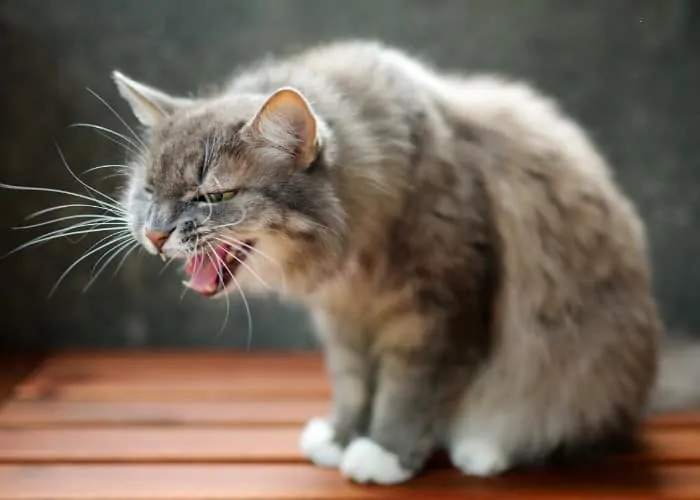
In my opinion, this should be the first thing that crosses your mind if the cat seems to be hissing at nothing.
Is your cat alright?
Cats can hurt themselves without us having a clue that they’ve done so- until they let us know.
In this circumstance, your cat’s hiss isn’t a cry for help, but giving you notice to leave them alone for the time being.
Either that or to at least proceed with caution, so whatever might be hurting isn’t made worse.
In a situation like this, it’s best to gently and slowly approach the cat, only getting as close to it as it lets you before getting uncomfortable. If it gets up and walks away, use it as an opportunity to watch its escape.
Is it limping?
Does its gait appear awkward?
Can you notice any wounds?
Did it leave any extras where it was before it walked away, such as blood, stool, or urine?
Some of the best investigation work can be done just by observing rather than handling the already stressed cat.
What to Do About a Hissing Cat
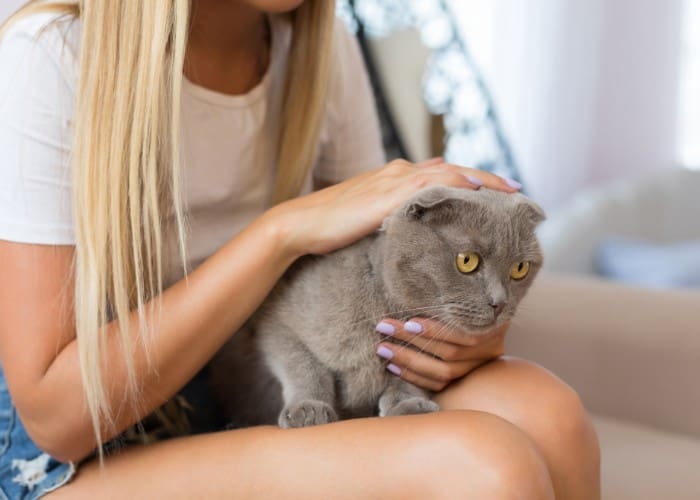
Here are some suggestions to try out if your cat is hissing out of character.
- Search out any strange smells that may correlate to the area that your cat is found hissing (even if it’s something that you’ve sprayed on yourself or bathed in). A cat’s mood can swing like a pendulum because of scent. They can get elated, relaxed, or problematic.
- As mentioned above, search your home and outdoors for any source of high EMF spikes. Seeing to it that all EMF levels are normal is healthy in many ways for you and your family, as well as your cat.
- Be observant and careful to look into the physical situation of your cat (as stated above concerning injury) and respond accordingly.
- See what you can do about other animals in the home or outside. Make sure that your cat has a place where it feels safe and free of any hassle from other four-legged friends.
- Try not to jump to conclusions.
Final Thoughts
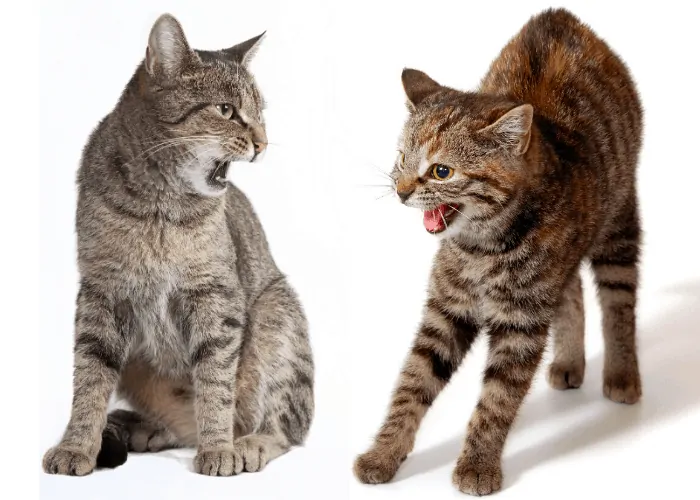
Things happen that we don’t see, hear, or smell that cats can get triggered by.
Mice running through walls, strange smells like the scent of your neighbor’s cat on your clothes, a tomcat howling into the night just out of your earshot, etc., are all things that we might overlook.
Cats can certainly be mysterious creatures. But like all mysteries, clues can be followed to figure out what’s going on.
And when you do figure out the source of your cat’s hissing and remove it to the best of your ability, you’ll have a more relaxed and happier pet.

